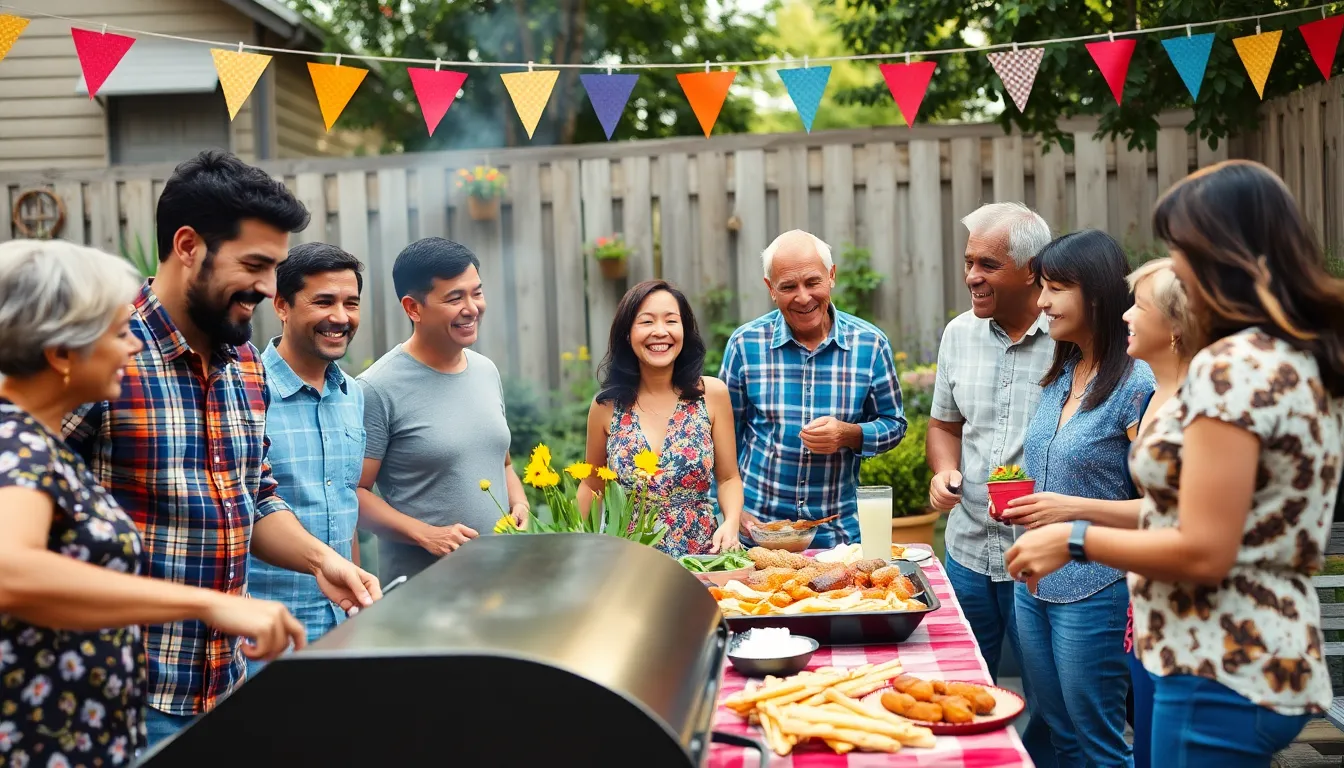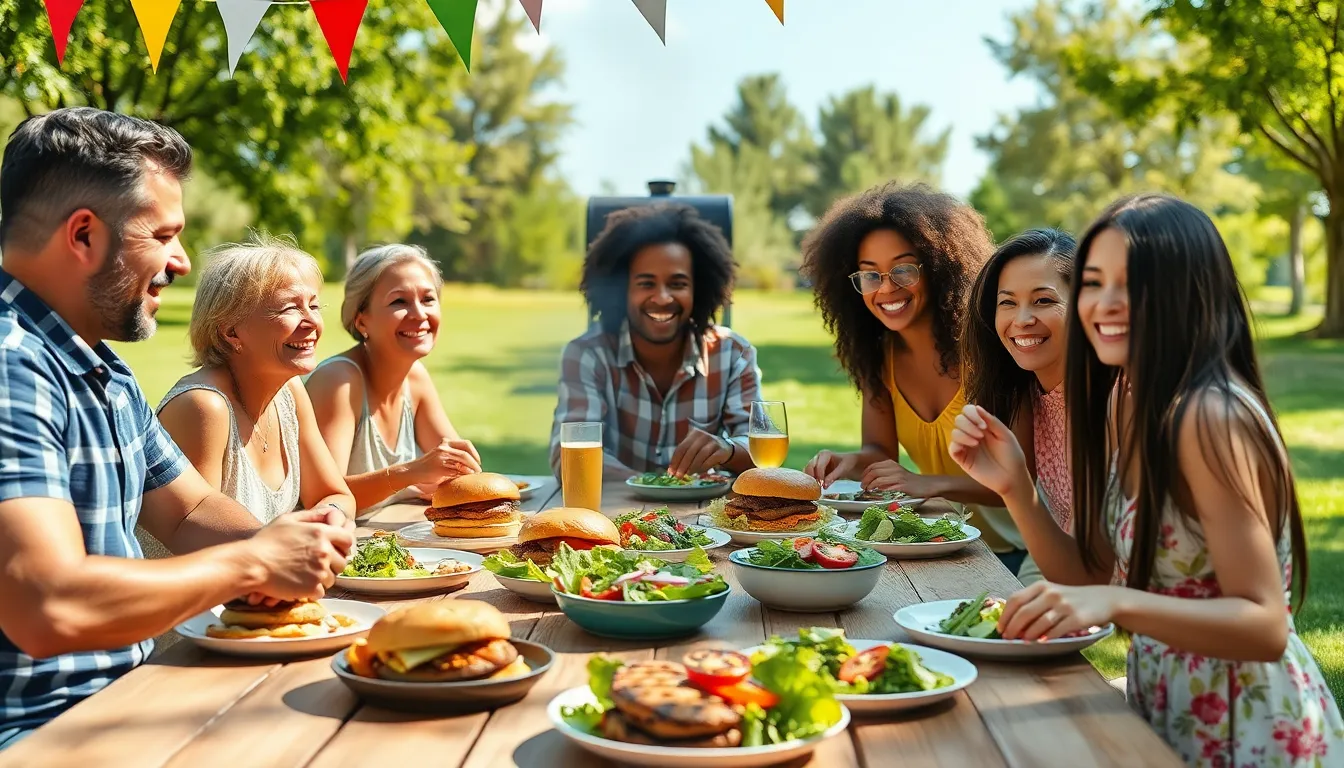Family event traditions are the glue that holds loved ones together, creating memories that last a lifetime. Whether it’s that annual barbecue where Uncle Joe tries to impress everyone with his questionable grilling skills or Grandma’s legendary holiday cookie bake-off, these rituals add flavor to family gatherings. They’re the quirky stories that get retold at every reunion, and the inside jokes that make everyone chuckle, even if they’ve heard them a million times.
In a world that often feels chaotic, these traditions offer a comforting sense of belonging. They remind families of their roots and foster connections that span generations. So, let’s dive into the delightful world of family event traditions and explore how they can transform ordinary get-togethers into unforgettable celebrations. After all, who wouldn’t want to spice up their family life with a little humor and a lot of heart?
Table of Contents
ToggleOverview of Family Event Traditions
Family event traditions play a crucial role in creating lasting bonds and cherished memories. Each gathering presents an opportunity for laughter, connection, and shared experiences. Whether it’s an annual barbecue or a holiday cookie bake-off, these events become touchstones of family life.
Unique rituals, such as making homemade ornaments during winter holidays or hosting themed game nights, illustrate the diversity of family traditions. These practices foster a sense of belonging, helping family members feel valued and connected. In addition, they often carry stories or inside jokes that deepen relationships among participants.
Reunion events often enhance the significance of family traditions. Regular gatherings, like summer picnics, allow family members to catch up and strengthen relationships. Celebrating milestones, such as birthdays and anniversaries, provides another avenue for creating meaningful experiences together.
Furthermore, engaging in cultural traditions, such as distinct meal preparations or festive activities, connects families to their heritage. Cooking family recipes, for example, not only preserves culinary history but also brings families together in the kitchen during gatherings. Sharing these experiences across generations cultivates a legacy of love and togetherness.
Enjoying these moments as a collective reinforces family unity. Families that prioritize time spent together often find their relationships grow deeper over time. By committing to these traditions, they transform ordinary events into memorable celebrations filled with joy and warmth.
Importance of Family Event Traditions

Family event traditions play a critical role in fostering connections among relatives and creating memorable experiences.
Strengthening Family Bonds
Family traditions build strong relationships among members. Engaging in shared rituals fosters trust and opens lines of communication. Annual gatherings, such as barbecues or holiday celebrations, create an environment where family members feel valued. These events provide opportunities for laughter and sharing stories. New generations learn the importance of unity through these experiences. Emphasizing togetherness during traditions encourages family members to rely on one another, ultimately forming deeper emotional connections.
Creating Lasting Memories
Memorable experiences often stem from family traditions. Participants cherish these moments long after they occur. Events like themed game nights or holiday cookie bake-offs become part of family lore, enriching collective histories. Visual reminders, such as photos from gatherings, serve as tangible keepsakes of joyful times. Participating in cultural traditions helps preserve family heritage, creating a sense of identity and continuity. Families celebrating achievements together mark milestones through these memorable events, ensuring they become cherished parts of their collective narrative.
Common Family Event Traditions
Family event traditions create opportunities for connection and joy. These shared rituals often strengthen familial ties, ensuring treasured memories last.
Family Reunions
Family reunions provide a chance for relatives to reconnect, reminisce, and celebrate. Often held annually, these gatherings feature activities like games, potlucks, and storytelling. Families create a relaxed environment, allowing everyone to catch up and reinforce bonds. Cousins may explore together while grandparents share stories of their youth. Each reunion contributes to the family lore, establishing a sense of continuity through generations. Planning ahead ensures maximum attendance, solidifying the commitment to maintaining these important traditions.
Holiday Celebrations
Holiday celebrations offer unique avenues for family gatherings, highlighting shared customs. Many families enjoy preparing traditional meals together, blending different culinary styles. Decorating houses, preparing dishes, or engaging in group activities can become annual favorites. Crafting personalized ornaments or setting up themed decorations adds a special touch. Families often exchange gifts, fostering expressions of love and appreciation. These festivities not only create joyful memories but also allow for cultural expression, ensuring past traditions live on.
Milestone Celebrations
Milestone celebrations recognize significant events in family members’ lives. Birthdays, graduations, and weddings elicit excitement and joy during family gatherings. Celebrating achievements through parties or ceremonies fosters unity and collective pride. Each milestone often features unique rituals, such as special toasts or shared experiences. Highlighting personal accomplishments reinforces support within the family, showing that every member’s journey matters. By commemorating these occasions, families craft understanding and recognition, strengthening their ties even further.
Unique Family Event Traditions Around the World
Family event traditions differ widely, reflecting cultural heritage and values. Exploring these unique rituals reveals how families celebrate together across various regions.
Cultural Variations
Cultural variations shape family traditions in distinctive ways. In Mexico, families gather for Día de los Muertos, honoring loved ones with altars filled with mementos. In Japan, Oshogatsu marks the New Year with special meals and activities that engage family members. Ghana’s annual family reunions include sharing stories to preserve ancestry. In India, festivals like Diwali involve elaborate gatherings where families decorate homes and share sweets. These diverse rituals deepen connections while highlighting shared values and heritage.
Modern Adaptations
Modern adaptations of family traditions reflect evolving lifestyles. Digital platforms facilitate virtual gatherings, allowing families to connect despite geographical distances. Families may create shared meal kits for holiday celebrations, merging traditional recipes with contemporary culinary trends. Tailoring events, like themed movie nights, showcases interests and personalities in different ways. Embracing technology not only preserves traditions but also introduces new elements that cater to busy schedules. Engaging in unique experiences ensures that families bond meaningfully, even as customs evolve.
Tips for Starting Your Own Family Event Traditions
Creating family event traditions fosters connection and builds lasting memories. Begin by identifying shared interests within the family. Hosting an annual picnic can provide an excellent foundation for bringing relatives together.
Encouraging everyone to contribute ideas strengthens the sense of ownership. Planning themed game nights gives family members something to look forward to, especially if everyone suggests their favorite games.
Incorporate cultural elements to personalize gatherings. Preparing traditional meals evokes connections to heritage and enhances the celebration’s significance. Invite family members to share stories behind beloved recipes, enriching the experience.
Establish a consistent schedule for gatherings. Regular events foster anticipation while creating a tradition that everyone expects. Aim for significant dates like holidays or family birthdays, ensuring participation becomes easier.
Documenting these events is crucial for preservation. Taking photographs or creating a family scrapbook captures memories. Urging everyone to share highlights encourages storytelling and adds meaning to the tradition.
Exploring modern adaptations enhances accessibility. Using digital platforms allows families separated by distance to engage together. Maintaining connections through virtual reunions can ensure participation, making traditions evolve with lifestyle changes.
Celebrating milestones serves as a focal point for unity. Acknowledging achievements like graduations and anniversaries reinforces family pride. Families can benefit from creating distinct rituals for these occasions, enhancing their collective narrative.
Starting family event traditions leads to enriched experiences and deeper connections. With creativity and commitment, families can create cherished rituals that adapt and endure through generations.
Family event traditions play a crucial role in nurturing relationships and creating lasting memories. They transform simple gatherings into meaningful celebrations filled with love and laughter. By embracing both traditional and modern practices, families can adapt these rituals to fit their lifestyles while ensuring that their heritage remains alive.
These traditions foster a sense of belonging and connection across generations. Each shared experience becomes a cherished part of the family story, reinforcing emotional bonds and collective pride. As families continue to create and evolve their traditions, they not only honor their past but also build a brighter future together.






